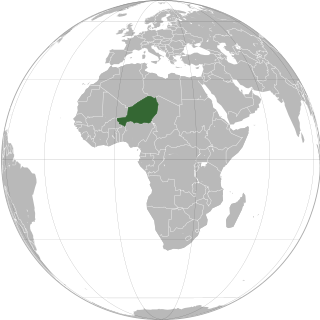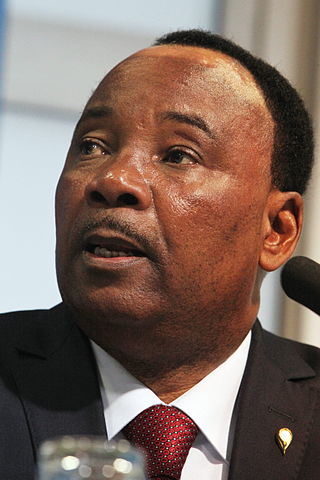 |
|---|
| Judiciary |
The Rally for France (French : Rassemblement pour la France, RPF) was a political party in Niger.
 |
|---|
| Judiciary |
The Rally for France (French : Rassemblement pour la France, RPF) was a political party in Niger.
Founded by French residents in the territory, the party's Jean Audu, won one of the three seats allotted to Niger in the October 10, 1953 elections to the Assembly of the French Union. [1]

Niger or the Niger, officially the Republic of the Niger, is a landlocked country in West Africa. It is a unitary state bordered by Libya to the northeast, Chad to the east, Nigeria to the south, Benin and Burkina Faso to the southwest, Mali to the west, and Algeria to the northwest. It covers a land area of almost 1,270,000 km2 (490,000 sq mi), making it the largest landlocked country in West Africa and the second largest landlocked nation in Africa behind Chad. Over 80% of its land area lies in the Sahara. Its predominantly Muslim population of about 25 million lives mostly in clusters in the south and west of the country. The capital Niamey is located in Niger's southwest corner along the namesake Niger River.
Humans have inhabited present-day Niger since prehistoric times, with evidence of early activity dating back 60,000 years. The region hosted ancient rock carvings and pastoral communities from 7,000 BCE. Once fertile, it supported large settlements and cattle herding until the climate became arid around 2500 BCE.

Politics of Niger takes place in a framework of a semi-presidential representative democratic republic, whereby the President of Niger is head of state and the Prime Minister of Niger head of government, and of a multi-party system. Executive power is exercised by the government. Legislative power is vested in both the government and the National Assembly.

Hama Amadou was a Nigerien politician who was Prime Minister of Niger from 1995 to 1996 and again from 2000 to 2007. He was also Secretary-General of the National Movement for the Development of Society (MNSD-Nassara) from 1991 to 2001 and President of the MNSD-Nassara from 2001 to 2009. Amadou was from the Kurtey, a Fula sub-group, and was raised in the Tillaberi Region, in the Niger River valley, north of Niamey.

Mamadou Tandja was a Nigerien politician who was President of Niger from 1999 to 2010. He was President of the National Movement for the Development of Society (MNSD) from 1991 to 1999 and unsuccessfully ran as the MNSD's presidential candidate in 1993 and 1996 before being elected to his first term in 1999. While serving as President of Niger, he was also Chairman of the Economic Community of West African States from 2005 to 2007.

Rap Nigerien is a hip hop music style that first appeared in Niamey, Niger, at the end of 1998.

Elections in Niger take place within the framework of a semi-presidential system. The President and National Assembly are elected by the public, with elections organised by the Independent National Electoral Commission (CENI).

Mahamadou Issoufou is a Nigerien politician who served as the president of Niger from 7 April 2011 to 2 April 2021. Issoufou was the prime minister of Niger from 1993 to 1994, president of the National Assembly from 1995 to 1996, and a candidate in each presidential election from 1993 to 2016. He led the Nigerien Party for Democracy and Socialism (PNDS-Tarayya), a social democratic party, from its foundation in 1990 until his election as president in 2011. During the presidency of Mamadou Tandja (1999–2010), Issoufou was the main opposition leader.

The National Movement for the Society of Development, also known as the National Movement for the Development of Society is a political party in Niger. Founded under the military government of the 1974–1990 period, it was the ruling party of Niger from 1989 to 1993 and again from 1999 until 2010, when a coup on 18 February 2010, by a military junta called the Supreme Council for the Restoration of Democracy (CSRD), ousted President Mamadou Tandja.

The Nigerien Progressive Party – African Democratic Rally is a political party in Niger. It was the nation's leading political party of the pre-independence era, becoming the sole legal party of the First Republic (1960–1974). It was led by Niger's first President, Hamani Diori. After the end of military rule, the party reappeared as a minor parliamentary party led by Diori's son, Abdoulaye Hamani Diori.

Mohamed Bazoum is a Nigerien politician who served as the 10th president of Niger from 2021 to 2023. He assumed office in April 2021 after winning the 2020–21 presidential election and surviving a coup d'état attempt. He was ousted in the 2023 Nigerien coup d'état by members of the presidential guard and the armed forces led by Abdourahamane Tchiani.

The Republic of Niger has had seven constitutions, two substantial constitutional revisions, and two periods of rule by decree since its independence from French colonial rule in 1960. The "Seventh Republic" operated under the Constitution of 2010 until its dissolution in 2023 by General Abdourahamane Tchiani in a coup d'état.

The Union of Popular Forces for Democracy and Progress–Sawaba is a political party in Niger, founded as the Nigerien Democratic Union in 1954. The original party, founded by Nigerien Progressive Party (PPN) co-leader Djibo Bakary when he was expelled from the PPN. In the mid-1950s it created a broad coalition led by urban leftists but forged of conservative rural notables, especially from Hausa areas, which dominated the nascent Nigerien independence movement. In this period it was renamed Mouvement Socialiste Africain–Sawaba, and then simply Sawaba. In pushing for complete independence from France in a 1958 referendum, the party fractured. At independence in 1960 it found itself in opposition and outlawed by Niger's first president, Hamani Diori. From exile, the party attempted an abortive guerrilla campaign in the mid-1960s, and then largely disappeared. Its leadership returned to Niger following the 1974 military coup, but soon found themselves arrested, in exile, or marginalised. Following the return of democracy in 1991, the now elderly Bakary re-founded the party as UDFP–Sawaba. In the 1993 elections it took only a small numbers of votes. Within the year, the party had split, with a new faction (UDFR–Sawaba) joining the government coalition. Despite Bakary's death in 1998 and their continued electoral underachievement, both parties holding the Sawaba name continue.
The 1996 Nigerien coup d'état was a military coup d'état which occurred on 27 January 1996 in Niamey, Niger. It ousted Niger's first democratically elected president, Mahamane Ousmane after nearly three years in power and installed General Ibrahim Baré Maïnassara as head of state. Prime Minister Hama Amadou was arrested in the coup and several soldiers and presidential guards were killed in the fighting.

Slavery in Niger involves different practices which have been practiced in the Sahel region for many centuries and which persist to this day. The Bornu Empire in the eastern part of Niger was an active part of the trans-Saharan slave trade for hundreds of years. Other ethnic groups in the country similarly had a history of slavery, although this varied and in some places slavery was largely limited to the political and economic elite.

General elections were held in Niger on 31 January 2011 to elect the President and National Assembly, with a second round of the presidential elections on 12 March. The first round of the presidential elections was originally scheduled to be held on 3 January and the second round on 31 January, but was later postponed. The elections followed a military coup in February 2010 that ousted President Mamadou Tandja.

General elections were held in Niger on 21 February 2016, with a presidential run-off held on 20 March. A total of 15 candidates ran for the presidency, with incumbent President Mahamadou Issoufou running for re-election for a second term. There were two main opposition candidates also vying for the top post, Seyni Oumarou of the National Movement for the Society of Development (MNSD), who lost to Issoufou in 2011, and Hama Amadou of MODEN/FA, who has been campaigning from prison since November 2015. Most of the opposition agreed to align for the second round to back the second-placed candidate against Issoufou.